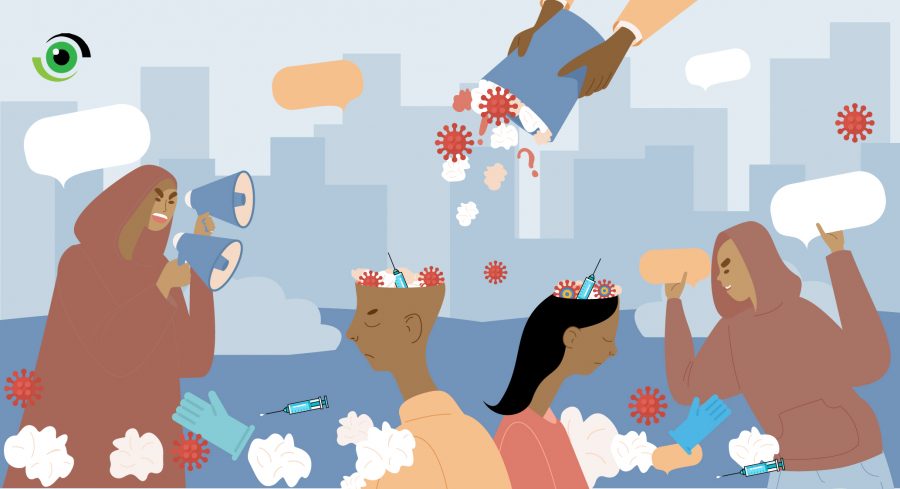“Nobody can convince me to take the COVID-19 vaccine. I don’t trust the government to give me anything that is free and good for me. Nothing is free in Nigeria. I know they want to insert a microchip in us so that they can control us”, Mary said.
“I would rather travel to Ghana or Dubai to take the vaccine than take it here in Nigeria. I trust the vaccine itself, but I don’t think the one they’re giving us here in Nigeria is real”, Babatunde said.
These are statements from Nigerians asked if they would take the COVID-19 vaccine. This doesn’t come as a surprise considering the amount of misinformation about the vaccine online.
Transformative and fast tool, with a caveat
The internet has transformed the global communication landscape leading to unparalleled opportunities to seek and share information, including health, quickly and easily. However, it has also accelerated misinformation and how individuals engage with health content. The spread of misinformation during disease outbreaks has become a global health issue.
Nigeria recorded its first confirmed case of the coronavirus in February 2020. This was followed by the rapid spread of fake news about COVID-19. As with other disease outbreaks, the COVID-19 pandemic has seen people searching for answers to symptoms, cures, and ways the coronavirus might affect them. It is then no surprise that misinformation has flooded the internet. There are many unknowns about the virus and this has created an information gap, and opportunities for misinformation to thrive.
Pre-vaccination campaign efforts in Nigeria
The months before Nigeria received its first batch of vaccines were critical to a successful vaccination campaign. Before the vaccine distribution started, it was important to get ahead of negative narratives that may arise. Already, there had been misinformation about COVID-19 vaccines in Nigeria. The National Primary Health Care Development Agency (NPHCDA) launched a campaign, #YesToCOVID19Vaccine, to encourage uptake of the vaccine in Nigeria. They sensitised various stakeholders — media professionals, traditional and religious leaders, entertainers, healthcare workers — leveraging media campaigns and town-hall meetings to achieve this. Other government organisations contributed to pushing messages around the safety of the vaccine.
Africa Check and Nigeria Health Watch also debunked false COVID-19 vaccine misinformation.
A different type of weak link
Dr. Sani Aliyu served as coordinator of the Presidential Task Force on COVID-19. He said one of the lessons learned during Nigeria’s COVID-19 response in 2020 was the need to engage influencers. He said most of the public health messages came from government agencies, but with time they realised the need for messaging to come from trusted influencers.
We are as strong as our weakest links when it comes to epidemic preparedness or response. But what if the problem comes from the strong links? Influential leaders with millions of followers on social media who misinform their audiences bear an extra responsibility in ensuring that they disseminate accurate and verified information.
There have been conspiracy theories about the development of COVID-19 vaccine clinical trials. The first person to receive the vaccine in the world was an elderly woman in the UK. Moreover, the basis of clinical trials is to first establish that the vaccines are safe for humans. It also establishes that vaccines are effective against specific infectious diseases like COVID-19. Data/reports from these investigations are presented to WHO and agencies like Food and Drug Administration in the U.S. or the European Medicines Agency. They only approve after objective peer and independent reviews.
Vaccines pass through Nigeria’s National Agency for Food and Drug Administration and Control for approval. “The WHO has no business conducting clinical trials. It is the companies behind the interventions that apply for approval to WHO, FDA, or EMA,” says Paul Adepoju, a science reporter with Nature and Community Manager at the International Center for Journalists crisis reporting forum.
In March 2021, Nigeria Health Watch conducted a survey with support from Meedan to understand the perception of Nigerians around the COVID-19 vaccine. The survey respondents came from rural and urban settings. Findings showed that about two fifths of respondents in urban areas indicated that their information about vaccines came from a health centre whereas only about a tenth of respondents in rural areas got their vaccine information from the same source.
Findings also showed that there is a need for community engagement to address hesitancy towards the COVID-19 vaccine. At the grassroots, community interactions with the support of religious and traditional institutions to pass the right message about the vaccine are important. These institutions are very influential and can empower people with the knowledge and information to protect themselves.
According to data from the Africa Data Hub, Nigeria has administered over 3.8 million doses as of June 2020. This is a far cry from what is needed to ensure everyone is safe.
The fight against COVID-19 vaccine misinformation is an aggressive one — one that requires everyone to play their role. To return to life as we know it, we must increase vaccine acceptance and uptake. Reducing or stopping the spread of COVID-19 vaccine misinformation is one major way to go about it.
